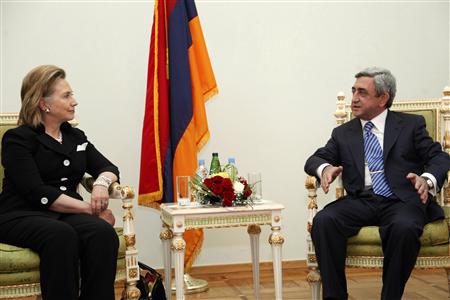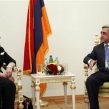
Clinton Follows Gates in Fence Mending Visit to Azerbaijan (Part One)
Publication: Eurasia Daily Monitor Volume: 7 Issue: 131
By:

US Secretary of State, Hillary Clinton, visited Azerbaijan on July 4 as part of a tour of the South Caucasus. Her schedule apparently allocated a mere half-day for official business in each of the three capitals, contributing to perceptions of this regional tour as perfunctory. The visit to Baku, however, had the special character of a fence-mending exercise, with a strategic partner that has been made to feel taken for granted and short-changed.
Clinton’s was the first visit by a US Secretary of State to Azerbaijan since James Baker’s visit 18 years ago. But her visit followed only four weeks after US Defense Secretary, Robert Gates, made an emergency visit there, which jump-started the fence-mending activity (Thomas Goltz, “Bad Blood in Baku,” Foreign Policy, June 11). This sequence reflects Washington’s long-standing neglect of Azerbaijan and its interests, but also a sudden recognition of Baku’s alienation and a sense of urgency about addressing it.
Gates had hand-delivered a mostly classified letter from US President, Barack Obama, to Azeri President, Ilham Aliyev, in which Obama acknowledged “that there are serious issues in our relationship, but I am confident that we can address them.” Clinton evidently addressed some of the non-military issues in her meeting with the Azeri president.
Two problems helped to concentrate Washington’s attention on Azerbaijan suddenly in June: the Pentagon’s growing reliance on the supply corridor via Azerbaijan to Afghanistan, and the State Department’s failure to guide Turkey into a rapprochement with Armenia that would have isolated Azerbaijan.
Both of those goals are driven by short-term considerations in Washington: the “surge” in Afghanistan and the annual US political drama over the Armenian genocide anniversary. Short-term goals and unpredictable moves have distorted a long-term US-Azerbaijan strategic partnership based on reciprocal interests in energy supply issues and regional security.
Azeri officials, such as Foreign Minister, Elmar Mammadyarov, and presidential adviser, Novruz Mammadov, have responded by stressing the long-term and mutually beneficial basis of what Azerbaijan regards as a strategic partnership with the US (www.day.az, June 16, July 4, 6). Baku has actively supported US objectives in the South Caucasus and beyond, and continues doing so without fanfare. But it expects Washington in that context to “look at Azerbaijan through the prism of Azerbaijan, not just through the prism of Afghanistan” (based on durable reciprocity, looking far beyond a short-term initiative such as the US “surge”). Similarly, Baku has resisted the sacrifice of its interests in the Washington-brokered rapprochement between Yerevan and Ankara.
Azerbaijan defines the resolution of the Karabakh conflict as its top national priority. President Aliyev reaffirmed this overriding priority on the agenda of his discussions with Clinton in Baku (www.day.az, July 4, 5).
The State Department-brokered Zurich Protocols, signed by Armenia and Turkey in October 2009, threatened to derail the conflict-resolution process by rewarding Yerevan’s intransigence. This prospect has now receded but remains present. The unratified protocols envisage opening the Turkish-Armenian border, without regard to Armenia’s occupation of seven Azeri districts beyond the Armenian-populated Karabakh. The protocols broke the conditional linkage between Turkey’s re-opening of that border and Armenia’s withdrawal from those districts. This linkage had formed the basis of the Azerbaijan-Turkey common position on conflict-resolution. It also provided Azerbaijan with the only significant peaceful lever, indeed positive inducement, toward withdrawal of Armenian troops from Azeri territory. Ankara has understood this reality and reinstated that linkage. For its part, Yerevan has reinterpreted the protocols to allow a continuing campaign for Armenian genocide recognition in the US, although the Obama administration had sought to stop that campaign through the protocols.
Clinton’s statements in Baku (and on the same day in Yerevan) reflected a partial acknowledgment of the protocols’ impasse. Although she and Assistant Secretary of State, Phillip Gordon, are personally committed to the Zurich process, they no longer demand the Protocols’ “unconditional” ratification by the Turkish and Armenian parliaments. They seem by now to recognize that separating the Armenia-Turkey normalization process from the Armenia-Azerbaijan conflict-resolution process would doom both processes to failure.
Nevertheless, Gordon’s Washington preview of the visit (State Department transcript, June 29, 30) and Clinton’s statements while in Yerevan continued urging ratification of the protocols by the Turkish and Armenian parliaments (Arminfo, July 4, 5). They strongly implied that Ankara was responsible for suspending the ratification, although Yerevan’s responsibility is clearly larger (January 2010 constitutional court decision and the April 2010 official suspension by President, Serge Sarksyan). Despite that record, Clinton praised Yerevan for “statesmanship” on this matter while admonishing Ankara that “the ball is in its court” for ratifying the protocols, and postulating even a Turkish “obligation” to do so. This may reflect US dissatisfaction with Turkey’s overall foreign policy orientation, and perhaps a hint at counter-leverage, rather than an analysis of the Armenia-Azerbaijan conflict and US-Azerbaijan relations on their merits.




